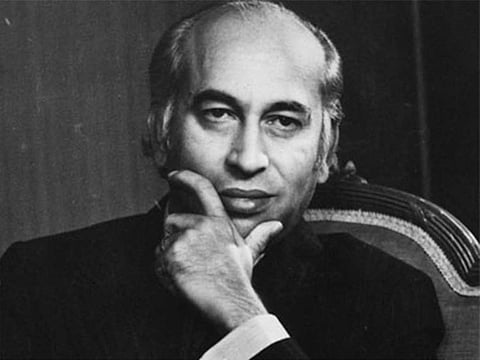Zulfikar Ali Bhutto: Pakistan’s charismatic leader honoured at last
Nishan-e-Pakistan award a recognition of Bhutto legacy and the history that shaped him

In a belated act of atonement, the Government of Pakistan posthumously awarded the Nishan-e-Pakistan, the country’s highest civilian award, to Zulfikar Ali Bhutto (ZAB), the former Prime Minister of Pakistan on March 23, 2025. His only surviving daughter, Sanam, received the award on behalf of her late father. Ironically, Bhutto’s son-in-law Asif Ali Zardari, the current President of Pakistan, bestowed this award on one of the most charismatic and consequential leaders in Pakistan’s history.
The Nishan-e-Pakistan is a symbolic recognition of Bhutto’s contributions to Pakistan, including his dynamic and activist foreign policy, his role in framing the 1973 Constitution, initiating Pakistan’s nuclear programme, and his leadership in rebuilding national confidence after the 1971 war.
After he was toppled by General Zia-ul-Haq in 1977, then military chief, he was tried for allegedly ordering the assassination of a political opponent. In a choreographed trial, he was sentenced to death and after the dismissal of his appeal at the Supreme Court, he was hanged on April 4, 1979. Called a “judicial murder”, the trial remains one of the most debated, ill-intentioned and controversial cases in Pakistan’s judicial history.
Bhutto was denied one tier of trial, and the case was directly taken to the Lahore High Court (LHC) chief justice, who had a grudge against him. At the Supreme Court independent judges were hounded out and the court was stuffed with obliging ones. In the end only judges from Punjab upheld the Lahore High Court death sentence. Years later, one of them had the audacity to admit on TV that judges were under pressure to pass the judgement desired by the “authorities”.
Mark Tully, then serving as BBC correspondent in Pakistan, famously said it was a question of one grave and two individuals – only one could go in it – Zia or Bhutto. Zia knew that he had sabotaged the constitution, which, under Article 6 meant death penalty.
Belated court admission
In a judgement announced in March 2024, on a reference filed in 2009, the Supreme Court admitted that Bhutto’s trial “did not meet the requirements of a fair trial and due process as enshrined in the Constitution.”
Son of Sir Shahnawaz Bhutto, a Sindhi landlord who, as Diwan of Junagarh State, was instrumental in its accession to Pakistan at the time of partition, ZAB had his early education in Bombay (now Mumbai). He graduated from Berkeley in California and then went on to complete his law degree from Oxford. He did his Bar at Law from the prestigious Lincoln’s Inn in 1953, from where Mohammad Ali Jinnah had done his Bar in 1896. Back in Karachi after his studies, he lectured at SM Law College from 1954 to 1958.
In 1958, at the young age of 28, he was made a minister by the then president after martial law was declared in Pakistan. He came of age when, at 33, he was appointed as the youngest foreign minister of Pakistan in 1963. Widely acclaimed for his knowledge, foresight, and brilliance, he connected Pakistan to the world. He is hailed for establishing early relationships with the Arab world and for particularly close ties with the UAE. In 1966, he quit Ayub Khan’s government over differences and founded the Pakistan Peoples’ Party on 30 November 1967. Ideologically left of center, he represented the anti-Vietnam generation of the 1960s and 1970s.
Sharp divisions
Pakistan’s 1971 elections brought sharp divisions between its two wings, leading to military action in East Pakistan and the establishment of Bangladesh. The Awami League had won an absolute majority. Having gained majority support in the West, Bhutto was handed power by the military, first as president and later as prime minister.
Having consolidated power, ZAB called early elections in 1977, which proved his undoing. The military took over after months of political turmoil, leading to his eventual execution in 1979.
While Bhutto was not directly responsible for the military’s actions in East Pakistan, his refusal to accept the Awami League’s mandate and his alignment with the military in denying majority rule contributed to the crisis.
During his years as prime minister, Bhutto pursued an activist foreign policy, strengthening ties with China and the Islamic world. He played a key role in rejuvenating the Organisation of Islamic Cooperation (OIC), holding its second summit in Lahore (1974), and emphasised Pakistan’s leadership in the Islamic world. In the wake of India’s nuclear test in Pokhran in 1974, he launched Pakistan’s nuclear programme.
Simla agreement
The Simla Agreement with India in 1972, securing the release of over 90,000 POWs without conceding much, is still considered his diplomatic masterclass.
His economic reforms, however, failed to yield the desired results and are still considered one of his biggest failures by his detractors.
Zulfikar Ali Bhutto’s journey from a rising political star to a fallen leader embodies Pakistan’s turbulent history. His charisma, leadership, and bold policies shaped the nation. His nuclear programme and Third World politics, along with his miscalculations, also led to his tragic downfall. Bhutto’s influence on Pakistan’s political landscape remains profound and enduring.
- Sajjad Ashraf served as an adjunct professor at the Lee Kuan Yew School of Public Policy, National University of Singapore from 2009 to 2017. He was a member of Pakistan Foreign Service from 1973 to 2008 and served as an ambassador to several countries.
Sign up for the Daily Briefing
Get the latest news and updates straight to your inbox



